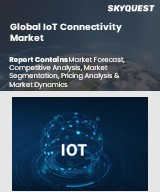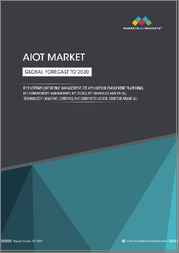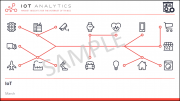
|
시장보고서
상품코드
1846112
IoT 커넥티비티 관리 플랫폼(CMP) 시장 규모 : 제품별, 용도별, 지역별 범위 및 예측Global IOT Connectivity Management Platform (CMP) Market Size By Product (Cellular, Non-Cellular, Market), By Application (Automotive, Consumer Electronics, Retail), By Geographic Scope And Forecast |
||||||
IoT 커넥티비티 관리 플랫폼(CMP) 시장 규모와 예측
IoT 커넥티비티 관리 플랫폼(CMP) 시장 규모는 2023년에 54억 2,000만 달러로 평가되었으며, 2024년부터 2031년까지 16.4%의 CAGR로 성장하여 2031년에는 159억 4,000만 달러에 달할 것으로 예측됩니다.
세계 IoT 커넥티비티 관리 플랫폼(CMP) 시장 촉진요인
IOT 커넥티비티 관리 플랫폼(CMP) 시장의 시장 촉진요인은 다양한 요인에 의해 영향을 받을 수 있습니다. 여기에는 다음과 같은 것들이 포함됩니다:
IoT 디바이스 보급 확대 : 제조, 헬스케어, 교통, 스마트 시티 등 다양한 산업에서 IoT 디바이스가 널리 사용됨에 따라, 방대한 수의 디바이스를 효율적으로 관리할 수 있는 연결 관리 시스템의 필요성이 높아지고 있습니다.
효율적인 디바이스 관리 요구사항IoT 디바이스가 급증함에 따라 기업은 디바이스의 연결성을 제어하고, 시스템 성능을 추적하며, 원활한 네트워크 연결을 보장하는 강력한 플랫폼이 필요합니다. CMP는 효과적인 디바이스 라이프사이클 관리에 필요한 리소스를 제공합니다.
데이터 보안과 프라이버시 중시 : IoT 도입이 증가함에 따라 데이터 보안과 프라이버시에 대한 우려도 커지고 있습니다. 보안 연결, 데이터 암호화, 법규 준수 등은 CMP가 자주 제공하는 기능 중 일부에 불과하며, IoT 설정을 보호하고자 하는 기업에게 필수적인 요소로 자리 잡았습니다.
확장성에 대한 요구 증가 : IoT 도입이 확대됨에 따라 기업들은 이에 맞춰 성장할 수 있는 솔루션을 원하고 있습니다. CMP는 성능 저하 없이 수많은 장치와 연결을 지원하는 데 필요한 확장성을 제공합니다.
클라우드 서비스와의 통합 : 처리, 분석, 데이터 저장을 위한 클라우드 서비스는 많은 IoT 솔루션과의 통합이 진행되고 있습니다. CMP는 이 인터페이스를 통해 클라우드 기능을 활용하고, IoT 기기 관리와 인사이트를 향상시킬 수 있도록 도와줍니다.
연결 옵션 강화 : CMP는 Wi-Fi, 셀룰러, LPWAN(Low Power Wide Area Network) 등 다양한 연결 옵션을 제공하므로, 기업은 자신의 사용 사례와 사용 환경에 가장 적합한 솔루션을 자유롭게 선택할 수 있습니다.
데이터 분석 및 인사이트 : CMP에는 고급 분석 기능이 내장되어 있는 경우가 많으며, 기업은 IoT 데이터에서 통찰력 있는 정보를 얻을 수 있습니다. 이를 통해 기업의 의사결정, 업무 최적화, 성과 향상을 촉진할 수 있습니다.
규제 준수 : 각국 정부가 데이터 보호 및 IoT 도입을 둘러싼 규칙을 도입하는 가운데, 기업들은 CMP를 사용하여 GDPR, HIPAA 등 수많은 표준 및 규제 준수를 보장하고 있습니다.
비용 관리 및 최적화 : CMP는 사용량을 추적하고, 데이터 소비를 제어하고, 가장 경제적인 연결 솔루션을 식별할 수 있는 도구를 제공함으로써 기업이 연결 비용을 최소화할 수 있도록 지원합니다.
5G 기술의 등장 : 더 빠르고 안정적인 연결성을 제공하는 5G 네트워크의 도입은 사물인터넷에 혁명을 일으키고 있습니다. 5G 연결 기능을 갖춘 CMP는 다양한 사물인터넷 애플리케이션에서 이 기술의 이점을 활용하기 위해 필수적입니다.
세계 IoT 커넥티비티 관리 플랫폼(CMP) 시장의 억제요인
IOT 커넥티비티 관리 플랫폼(CMP) 시장에는 몇 가지 요인이 시장 억제요인 및 과제로 작용할 수 있습니다. 여기에는 다음이 포함됩니다:
IoT 생태계의 복잡성 : IoT 생태계의 복잡성 : IoT 생태계에는 수많은 디바이스, 프로토콜, 통신 표준이 존재합니다. 이렇게 광범위하고 다양한 네트워크의 연결을 관리하는 것은 어렵고, 통합에 문제가 발생하거나 비용이 상승할 수 있습니다.
프라이버시 및 데이터 보안 문제 : IoT 기기의 증가를 고려할 때, 이러한 네트워크에서 교환되는 데이터의 보안과 프라이버시 보장은 매우 중요합니다. 기업들은 데이터 취급에 따른 리스크를 줄이고자 하기 때문에 데이터 유출 및 사이버 공격에 대한 우려로 인해 IoT CMP 솔루션의 도입이 영향을 받을 수 있습니다.
높은 초기 비용 : 소프트웨어, 하드웨어, 관련 인프라 구매는 IoT CMP 솔루션의 구축 및 도입에 따른 높은 초기 비용의 일부에 불과합니다. 높은 초기 비용은 시장 진입을 시도하는 신규 기업이나 중소기업에게 걸림돌이 될 수 있습니다.
확장성 문제 : 사물인터넷(IoT) 디바이스의 수가 증가함에 따라, 방대한 데이터 양과 수많은 디바이스에 대응하는 연결 관리 솔루션의 확장이 어려워지고 있습니다. CMP 솔루션의 확장성을 확보하는 것은 어렵지만 매우 중요합니다.
표준과 프로토콜의 단절 : IoT 연결에 공통된 표준과 프로토콜이 존재하지 않기 때문에 상호운용성 문제가 발생할 수 있습니다. CMP 솔루션이 다양한 표준과 프로토콜을 지원해야 하기 때문에 개발 및 통합이 어려울 수 있습니다.
규제 및 컴플라이언스 과제 : GDPR과 같은 데이터 보호법 및 산업별 규정과 GDPR과 같은 다양한 지역 및 국가별 규제와 표준을 준수하는 것은 비용이 많이 들고 복잡할 수 있습니다. 어려운 일이지만, CMP 솔루션이 모든 법적 기준을 준수하는 것이 매우 중요합니다.
기술의 진화 : CMP 솔루션은 IoT 기술의 빠른 발전 속도에 대응하기 어려울 수 있습니다. 새로운 기술과 트렌드에 대응하기 위한 끊임없는 업데이트와 수정으로 인해 리소스가 부족할 수 있습니다.
벤더 인클로저 : 특정 CMP 솔루션은 특정 벤더나 기술에 대한 신뢰를 구축하여 벤더 락인(vendor lock-in)을 유발할 수 있습니다. 다른 시스템과의 통합이나 공급업체 이동이 필요한 경우, 선택의 폭이 좁아지고 비용이 증가할 수 있습니다.
기존 시스템과의 통합 : IoT CMP 솔루션과 기존 기업 시스템 및 IT 시스템과의 통합은 어려울 수 있습니다. 호환성 문제 및 특수 커넥터가 필요하기 때문에 도입에 소요되는 시간과 비용이 증가할 수 있습니다.
시장 경쟁 : IoT CMP 분야에 진출하는 기업이 늘어나면 가격 경쟁이 심화되어 이익 폭이 축소될 가능성이 있습니다. 경쟁 우위를 유지하면서 차별화를 꾀하는 것은 어려운 일입니다.
지식과 경험 부족 : 일부 기업은 IoT 커넥티비티 관리에 필요한 지식과 경험이 부족하여 CMP 솔루션 도입이 늦어질 수 있습니다. 시장 확대를 위해서는 CMP 솔루션의 장점을 홍보하고 잠재 고객을 교육하는 것이 필수적입니다.
운영 비용 : 지원 및 업그레이드 비용은 IoT 커넥티비티 유지 및 유지보수와 관련된 지속적인 비용의 일부에 불과합니다. CMP 솔루션의 장기적인 지속가능성은 효율적인 비용 관리에 달려 있습니다.
목차
제1장 소개
- 시장 정의
- 시장 세분화
- 조사 방법
제2장 주요 요약
- 주요 조사 결과
- 시장 개요
- 시장 하이라이트
제3장 시장 개요
- 시장 규모와 성장의 가능성
- 시장 동향
- 시장 성장 촉진요인
- 시장 성장 억제요인
- 시장 기회
- Porter's Five Forces 분석
제4장 IoT 커넥티비티 관리 플랫폼(CMP) 시장 : 전개 방식별
- 퍼블릭 CMP
- 프라이빗 CMP
- 매니지드 CMP
제5장 IoT 커넥티비티 관리 플랫폼(CMP) 시장 : 최종사용자별
- 산업용 IoT(IIoT)
- 스마트 시티
- 헬스케어
- 자동차
- 농업
- 소매
제6장 IoT 커넥티비티 관리 플랫폼(CMP) 시장 : 용도별
- 디바이스 관리
- 네트워크 관리
- 데이터 관리
- 보안 관리
제7장 지역별 분석
- 북미
- 미국
- 캐나다
- 멕시코
- 유럽
- 영국
- 독일
- 프랑스
- 이탈리아
- 아시아태평양
- 중국
- 일본
- 인도
- 호주
- 라틴아메리카
- 브라질
- 아르헨티나
- 칠레
- 중동 및 아프리카
- 남아프리카공화국
- 사우디아라비아
- 아랍에미리트
제8장 시장 역학
- 시장 성장 촉진요인
- 시장 성장 억제요인
- 시장 기회
- COVID-19의 시장에 대한 영향
제9장 경쟁 구도
- 주요 기업
- 시장 점유율 분석
제10장 기업 개요
- Proximus Group
- Cisco Systems
- Nokia
- Truphone
- Huawei
- Ericsson
- Comarch
- KORE
- Arm
- HPE
- ZTE
- Links Field
제11장 시장 전망과 기회
- 신기술
- 향후 시장 동향
- 투자 기회
제12장 부록
- 약어 리스트
- 정보 출처와 참고문헌
IOT Connectivity Management Platform (CMP) Market Size And Forecast
IOT Connectivity Management Platform (CMP) Market size was valued at USD 5.42 Billion in 2023 and is estimated to reach USD 15.94 Billion by 2031, growing at a CAGR of 16.4% from 2024 to 2031.
Global IOT Connectivity Management Platform (CMP) Market Drivers
The market drivers for the IOT Connectivity Management Platform (CMP) Market can be influenced by various factors. These may include:
Growing Adoption of IoT Devices: As IoT devices become more widely used across a range of industries, including as manufacturing, healthcare, transportation, and smart cities, there is an increasing need for efficient connectivity management systems to manage massive numbers of devices.
Requirement for Effective Device Management: With the proliferation of IoT devices, enterprises need strong platforms to control device connectivity, track system performance, and guarantee smooth network connectivity. The resources required for effective device lifecycle management are offered by CMPs.
Emphasis on Data Security and Privacy: As IoT installations increase, so are worries about data security and privacy. Secure connectivity, data encryption, and regulatory compliance are just a few of the capabilities that CMPs frequently offer, making them indispensable for enterprises trying to protect their IoT settings.
Growing Need for Scalability: As IoT deployments expand, businesses are looking for solutions that can grow with them. Without sacrificing performance, CMPs provide the scalability required to accommodate a high number of devices and connections.
Integration with Cloud Services: Cloud services for processing, analytics, and data storage are becoming more and more integrated with a lot of IoT solutions. By facilitating this interface, CMPs let businesses take advantage of cloud capabilities to improve IoT device management and insights.
Enhanced Connectivity Options: CMPs enable a variety of connectivity options, such as Wi-Fi, cellular, and LPWAN (Low Power Wide Area Network), giving businesses the freedom to select the solution that best suits their unique use cases and surroundings.
Data Analytics and Insights: CMPs frequently have sophisticated analytics built in, allowing businesses to extract insightful information from their IoT data. This facilitates decision-making, operational optimization, and performance enhancement for enterprises.
Regulatory Compliance: Organizations use CMPs to help assure compliance with numerous standards and regulations, such as GDPR, HIPAA, and others, as governments implement rules surrounding data protection and IoT installations.
Cost Management and Optimization: By offering tools for tracking usage, controlling data consumption, and identifying the most economical connectivity solutions, CMPs assist businesses in minimizing the cost of their connectivity.
Emergence of 5G Technology: By offering faster and more dependable connectivity, 5G network deployments are revolutionizing the Internet of Things. CMPs with 5G connectivity capability will be essential for taking advantage of this technology's advantages for a range of Internet of Things applications.
Global IOT Connectivity Management Platform (CMP) Market Restraints
Several factors can act as restraints or challenges for the IOT Connectivity Management Platform (CMP) Market. These may include:
IoT Ecosystem Complexity: A vast array of devices, protocols, and communication standards are all part of the IoT ecosystem. It can be difficult to manage connectivity across such a broad and diverse network, which can cause problems with integration and raise costs.
Privacy and Data Security Concerns: Ensuring the security and privacy of data exchanged over these networks is crucial given the growth of IoT devices. The adoption of IoT CMP solutions may be impacted by worries about data breaches and cyberattacks since companies want to reduce the risks involved with handling data.
High Initial Costs: Purchasing software, hardware, and related infrastructure are just a few of the high-up-front expenses that come with deploying and implementing IoT CMP solutions. Expensive beginning costs can be a deterrent for new or smaller companies trying to break into the market.
Scalability Issues: As the number of Internet of Things (IoT) devices increases, it becomes more difficult to scale connectivity management solutions to accommodate massive data volumes and a huge number of devices. It's difficult yet vital to make sure CMP solutions can scale well.
Broken Standards and Protocols: Interoperability problems may arise from the absence of common standards and protocols for IoT connectivity. The need for CMP solutions to support a variety of standards and protocols might make development and integration more difficult.
Regulatory and Compliance Challenges: Adhering to various local and regional regulations and standards, such as industry-specific rules and data protection laws like the GDPR, can be expensive and complicated. Although difficult, ensuring that CMP solutions adhere to all legal standards is crucial.
Technological Evolution: CMP solutions may find it challenging to stay up with the quick speed at which IoT technology is developing. Resources may be strained as a result of the constant updates and modifications required to accommodate new technology and developing trends.
Vendor lock-in: Reliances on particular vendors or technologies may be established by certain CMP solutions, resulting in vendor lock-in. If companies need to integrate with other systems or move suppliers, this might limit their options and drive up expenses.
Integration with Current Systems: It might be challenging to integrate IoT CMP solutions with current enterprise and IT systems. The time and expense of deployment may increase due to compatibility problems and the requirement for specialized connectors.
Market Competition: As more companies enter the IoT CMP space, there will likely be more pressure on prices and a smaller margin for profit. It's difficult to differentiate items while keeping a competitive advantage.
Lack of Knowledge and Experience: Some businesses may not have the necessary knowledge or experience with IoT connectivity management, which would cause CMP solutions to be adopted more slowly. Promoting the benefits of CMP solutions and educating prospective clients are essential for market expansion.
Operational Costs: Support and upgrade expenses are just a few of the ongoing expenses associated with sustaining and preserving IoT connectivity. The long-term sustainability of CMP solutions depends on efficient cost management.
Global IOT Connectivity Management Platform (CMP) Market Segmentation Analysis
The Global IOT Connectivity Management Platform (CMP) Market is Segmented on the basis of Deployment Model, Application, End-User, and Geography.
IOT Connectivity Management Platform (CMP) Market, By Deployment Model
Public CMP
Private CMP
Managed CMP
The Internet of Things (IoT) Connectivity Management Platform (CMP) market is crucial for managing IoT device connectivity efficiently, enabling companies to optimize their networks and streamline operations through better data management and connectivity services. Within this market, the deployment model segment is categorized into three sub-segments: Public CMP, Private CMP, and Managed CMP. Public CMPs are hosted on cloud infrastructures, allowing multiple users to access shared resources and providing a cost-effective solution as they scale based on demand. This model is particularly beneficial for small to medium-sized enterprises that require flexibility without significant upfront investment. Conversely, Private CMPs offer dedicated environments for individual organizations, enhancing data security and control over sensitive information.
This model is typically adopted by larger enterprises with stringent compliance requirements or those operating in regulated industries where data protection is paramount. Managed CMPs combine elements of both approaches, providing a third-party management solution where external vendors oversee the connectivity platform while delivering tailored services according to specific business needs. This option allows companies to focus on their core operations while leveraging the expertise of specialized providers. The growth of the IoT CMP market, influenced by increasing IoT device deployment across various sectors such as healthcare, automotive, and smart cities, highlights the importance of these deployment models, as businesses seek versatile, secure, and manageable connectivity solutions to navigate the complexities of IoT integration and optimize their digital transformation initiatives.
IOT Connectivity Management Platform (CMP) Market, End-User
Industrial IoT (IIoT)
Smart Cities
Healthcare
Automotive
Agriculture
Retail
The Internet of Things (IoT) Connectivity Management Platform (CMP) market is a rapidly evolving sector that facilitates efficient management of connected devices across various industries. One of the main segments within this market is the end-user categorization, which encompasses diverse applications such as Industrial IoT (IIoT), smart cities, healthcare, automotive, agriculture, and retail. Each of these sub-segments presents unique characteristics and requirements. In the industrial sector, IIoT focuses on enhancing operational efficiency, predictive maintenance, and real-time monitoring of machinery, driving automation and reducing operational costs. Smart cities leverage IoT connectivity to improve urban services, optimize resource management, and enhance citizens' quality of life through technologies like smart lighting, waste management, and traffic monitoring.
Healthcare applications utilize IoT for patient monitoring, telemedicine, and efficient hospital management, promoting better health outcomes and streamlined services. The automotive industry increasingly adopts IoT solutions for connected vehicles, enabling features like navigation, safety, and real-time diagnostics, ultimately enhancing the driving experience. Agriculture benefits from IoT through precision farming techniques that optimize yields and resource use while reducing environmental impact. Lastly, retail employs IoT CMP to boost operational efficiency, enhance customer experience through personalized offerings, and streamline inventory management. Together, these sub-segments demonstrate the widespread applicability of IoT technologies across various sectors, driving innovations that foster connectivity, efficiency, and sustainability in response to rapidly changing market demands and consumer expectations.
IOT Connectivity Management Platform (CMP) Market, By Application
Device Management
Network Management
Data Management
Security Management
The Internet of Things (IoT) Connectivity Management Platform (CMP) Market is pivotal for managing the vast network of interconnected devices and systems. This market segment specifically addresses the application needs surrounding the smooth operation and management of IoT devices, encompassing several critical sub-segments. Device Management focuses on the lifecycle management of devices, including provisioning, monitoring, updates, and troubleshooting, ensuring that devices are functioning optimally and can be scaled seamlessly.
Meanwhile, Network Management involves overseeing the communication networks that interconnect these devices, ensuring that data is transmitted reliably and efficiently, while also managing network performance and connectivity issues. Data Management encompasses the aggregation, storage, and analysis of data generated by IoT devices, facilitating insights and enabling real-time decision-making through robust data governance frameworks.
Lastly, Security Management addresses the increasing concerns around data privacy and protection, implementing protocols and measures to safeguard the integrity and confidentiality of data as it navigates the IoT ecosystem. Collectively, these sub-segments work in harmony to create a cohesive CMP environment that enhances interoperability, boosts operational efficiency, and mitigates security risks within IoT deployments. As the demand for IoT applications continues to surge across various industries, the CMP market will play an essential role in enabling organizations to efficiently manage their IoT assets and drive innovation through seamless connectivity and management solutions.
IOT Connectivity Management Platform (CMP) Market, By Geography
North America
Europe
Asia-Pacific
Latin America
Middle East and Africa
The Internet of Things (IoT) Connectivity Management Platform (CMP) Market is a burgeoning segment in the global tech landscape, characterized by its ability to streamline and manage connectivity for a multitude of IoT devices. This market is categorized by geography into five key regions: North America, Europe, Asia-Pacific, Latin America, and Middle East and Africa. North America, being a technological hub, showcases a significant demand for CMPs driven by a robust presence of IoT devices across industries like healthcare, automotive, and smart cities. Europe follows closely, with stringent regulations and a strong focus on sustainability prompting higher adoption of IoT solutions, particularly in sectors such as manufacturing and energy management.
The Asia-Pacific region is experiencing rapid growth due to burgeoning investments in smart infrastructure and a burgeoning number of IoT applications, particularly in countries like China and India, which are focusing on smart city initiatives. Latin America is gradually catching up, with an increasing emphasis on agricultural technologies and urban development, fueling the need for effective connectivity solutions. Lastly, the Middle East and Africa are witnessing a surge in digital transformation initiatives, particularly in telecommunications and energy sectors, which are vital for their economic growth. This geographical segmentation reveals varying levels of adoption and application of CMPs across regions, influenced by local market dynamics, technological advancements, and regulatory environments, thereby shaping the overall growth trajectory of the IoT CMP market worldwide.
Key Players
- The major players in the IOT Connectivity Management Platform (CMP) Market are:
- Proximus Group
- Cisco Systems
- Nokia
- Truphone
- Huawei
- Ericsson
- Comarch
- KORE
- Arm
- HPE
- ZTE
- Links Field
TABLE OF CONTENTS
1. Introduction
- Market Definition
- Market Segmentation
- Research Methodology
2. Executive Summary
- Key Findings
- Market Overview
- Market Highlights
3. Market Overview
- Market Size and Growth Potential
- Market Trends
- Market Drivers
- Market Restraints
- Market Opportunities
- Porter's Five Forces Analysis
4. IOT Connectivity Management Platform (CMP) Market, By Deployment Type
- Public CMP
- Private CMP
- Managed CMP
5 IOT Connectivity Management Platform (CMP) Market, By End-User
- Industrial IoT (IIoT)
- Smart Cities
- Healthcare
- Automotive
- Agriculture
- Retail
6 IOT Connectivity Management Platform (CMP) Market, By Application
- Device Management
- Network Management
- Data Management
- Security Management
7. Regional Analysis
- North America
- United States
- Canada
- Mexico
- Europe
- United Kingdom
- Germany
- France
- Italy
- Asia-Pacific
- China
- Japan
- India
- Australia
- Latin America
- Brazil
- Argentina
- Chile
- Middle East and Africa
- South Africa
- Saudi Arabia
- UAE
8. Market Dynamics
- Market Drivers
- Market Restraints
- Market Opportunities
- Impact of COVID-19 on the Market
9. Competitive Landscape
- Key Players
- Market Share Analysis
10. Company Profiles
- Proximus Group
- Cisco Systems
- Nokia
- Truphone
- Huawei
- Ericsson
- Comarch
- KORE
- Arm
- HPE
- ZTE
- Links Field
11. Market Outlook and Opportunities
- Emerging Technologies
- Future Market Trends
- Investment Opportunities
12. Appendix
- List of Abbreviations
- Sources and References



















